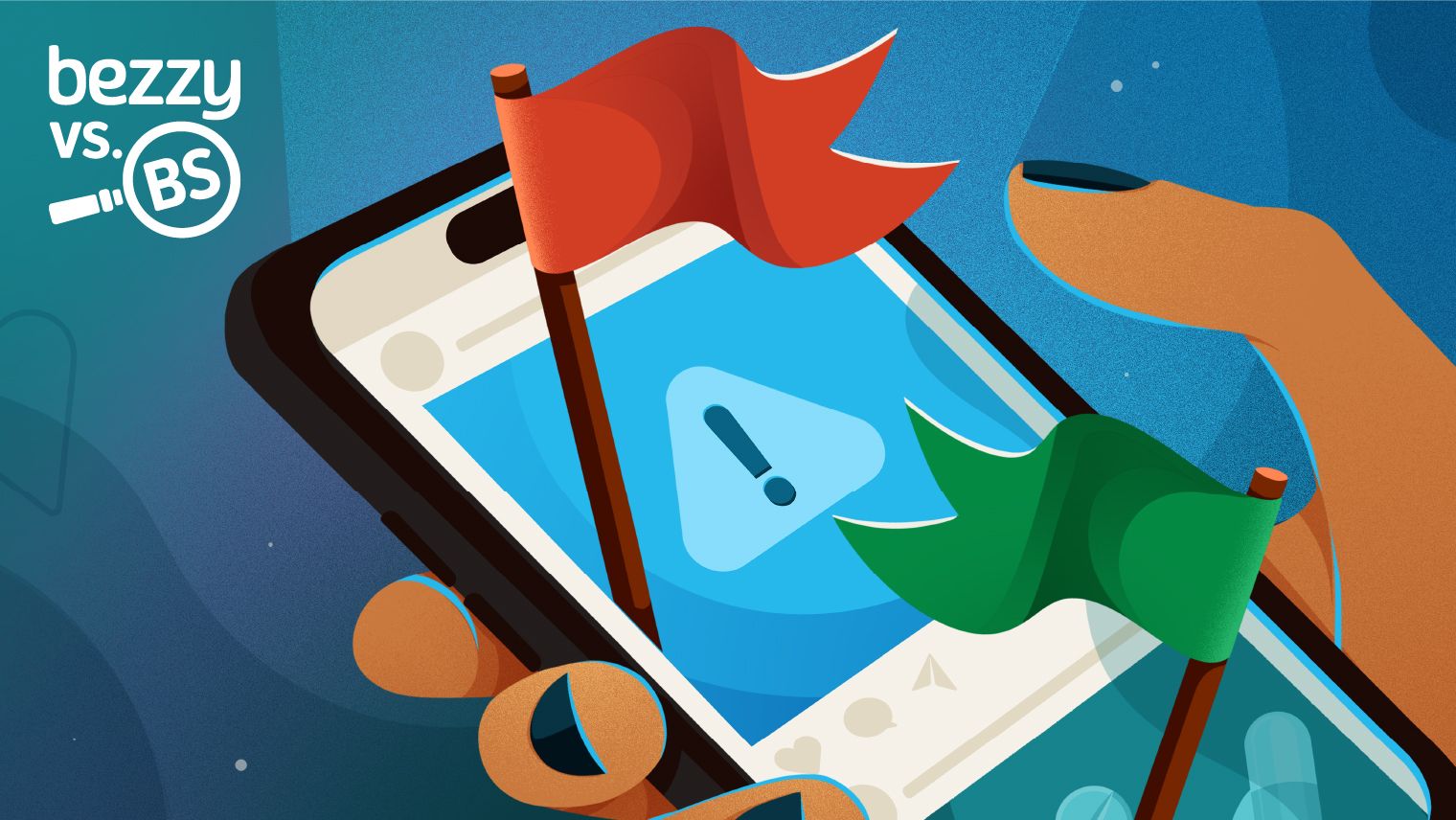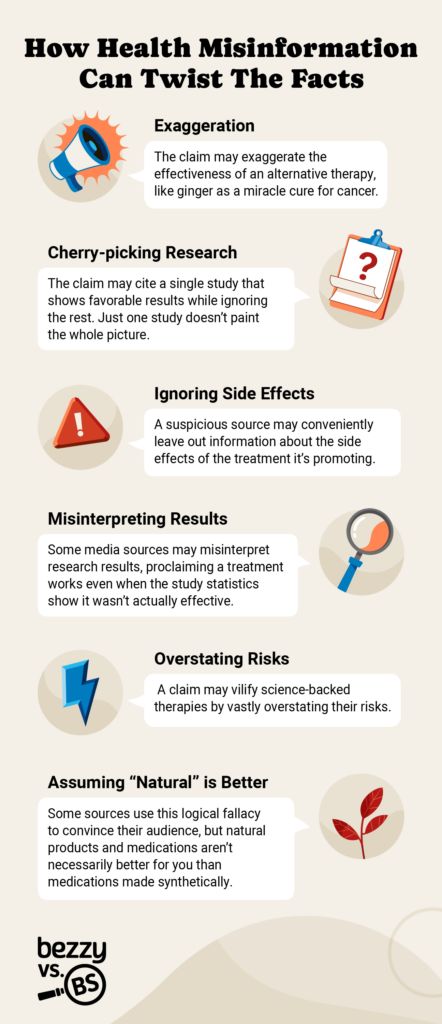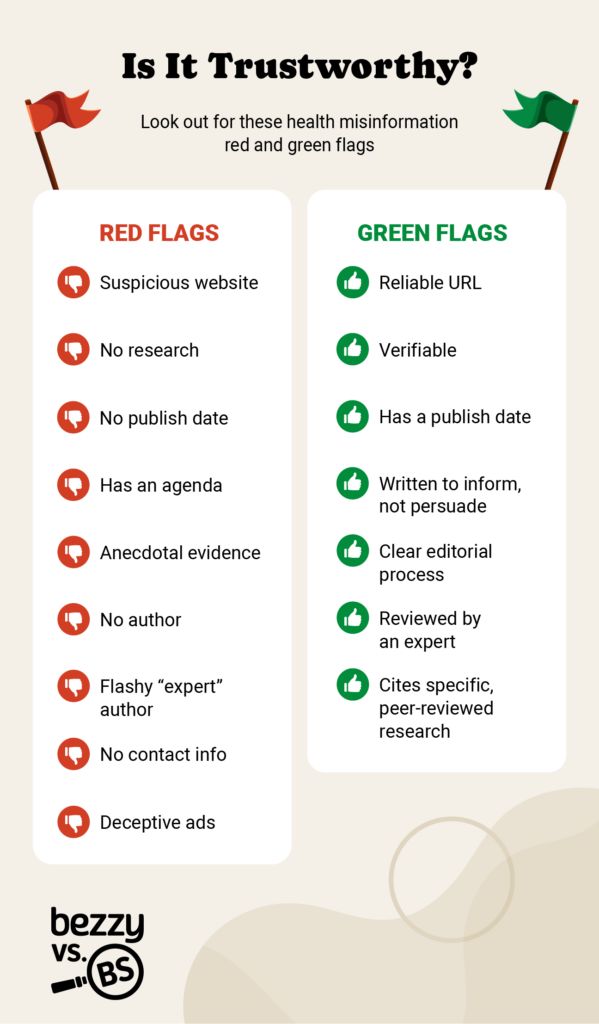Truth or Hype? How to Spot Health Misinformation
October 08, 2024
Content created for the Bezzy community and sponsored by our partners. Learn More

Illustration by Brittany England
Keeping up with health info is critical, especially when you have a chronic illness — but fake and fishy stories, ads, and recommendations are everywhere. Here’s how to suss out the truth.
A recent viral story on TikTok insisted that raw potato juice can cure throat infections. Another claimed that beer can help you get a better tan.
True? No. But they’re tempting to believe.
Misformation like this has clout on social media, spreading further and faster than fact-checked information. Attention-grabbing headlines are often easier to understand than evidence-based studies, and many of them make claims about miraculously healing serious illnesses.
But there are ways to protect yourself against medical misinformation. You can develop a spidey sense for detecting health claims that just don’t pass muster. Read on to learn how.


Strident alarms drown out nuanced voices
“The nuanced voices of scientists often do not resonate with the public as much as the strident alarms sounded by people of fame speaking in absolute terms,” write the authors of an editorial in the journal Circulation.
With social media, these “alarms” are increasingly common.
“False health claims come in all shapes and sizes,” said Kristen Panthagani, an emergency medicine physician and author of the medical blog about science in a world of untrue facts. “The most common ones I see are false rumors about vaccine safety, promotion of the ‘health benefits’ of supplements that have never actually been verified, and … promising to diagnose the cause of vague, complex symptoms, like fatigue.”
These claims may live on social media, but they affect people in the real world. Those seeking relief from symptoms like fatigue and pain are particularly susceptible.
Pop quiz
True or false: After a long weekend of overindulging, it’s a good idea to detox your body with ingredients like cucumber, apple cider vinegar, and green tea.
Answer: False. Your body is fully equipped to handle toxins and other unwanted substances. Detoxification is part of regular organ function, with the body naturally eliminating harmful substances through the kidneys, liver, digestive system, skin, and lungs.
Medical mistrust and dangerous health consequences
Exposure to health misinformation while scrolling Facebook, TikTok, or other social platforms can also lead to mistrust in doctors and research-backed medical treatments.
For instance, a recent TikTok trend encouraged people to drink the mineral borax, often used as a laundry detergent, with their morning coffee. When a woman diagnosed with a painful spinal condition gave the drink a try, she ended up vomiting and developing a severe headache.
In another example, a woman says she went to the hospital with a burnt esophagus after trying a TikTok influencer’s advice to eat an unpeeled orange coated with cinnamon and cayenne pepper. The influencer apparently claimed to have healed her body from a chronic illness.
“Misleading health information can lead people to make dangerous decisions about their own health and well-being,” said Irving Washington, senior vice president and executive director of the Health Misinformation and Trust Initiative at KFF, a nonprofit health policy research, polling, and news organization.
“This affects them individually and, at the broader level, public health,” Washington said, pointing out that false claims around COVID-19 vaccination led to vaccine hesitancy.
Of course, some complementary and alternative medicine (CAM) therapies can be helpful alongside conventional medical treatments. However, using them instead of conventional treatments can lead to disastrous results.
Research from 2017 found that people with cancer had a greater risk of death when they refused conventional cancer therapies, including radiotherapy and chemotherapy, in favor of CAM.
“Both natural and human-made products need to be tested to see if they are helpful,” explains Panthagani. “We can’t just assume something works because it was extracted from a plant.”
Did you know? We tend to have a “natural” bias
“Our preference for things deemed to be natural is so illogical and systematic that researchers have given it a name — the appeal to nature fallacy,” explains an article in Behavioral Scientist.
The “appeal to nature” fallacy is the belief that something is good or right because it’s natural — or bad or wrong because it’s unnatural.
Some examples of the “appeal to nature” fallacy:
- Homeopathic remedies are safe because they are derived from natural substances.
- Herbal medicines are safer than pharmaceuticals since they don’t contain chemicals.
- Eating ginger is a healthier way to treat cancer than chemotherapy because it’s from a plant.
Just because something is natural doesn’t mean it’s better or healthier for you. A lot of health misinformation contains this logical fallacy.
Many natural products have beneficial health effects, but others have been shown not to work at all. For many health conditions, synthetic (human-made) drugs are far more effective than natural medicines.
And some natural products can also have harmful side effects, just like synthetic drugs.
The art of fact twisting
Plenty of health claims making the rounds on social media aren’t backed by science, such as:
- sunscreen causes cancer
- raw milk is better for you than pasteurized milk (even amid bird flu outbreaks)
- there are “miracle” cures for cancer, like cannabis oil
The list goes on.
In a 2021 study, cancer experts looked for health misinformation in 200 of the most popular articles on social media about the four most common types of cancer. As reviewers defined it, a whopping third of the articles contained misinformation, and about a third of that was harmful information.
What do they have in common? It can be hard to put your finger on. Here are just some of their wily ways.

I would be very skeptical of any claims that present their product as some sort of miracle cure or a ‘secret’ that medical experts don’t know. These are marketing tactics to make you think you’ve found something special, but often overpromise and underdeliver.
— Kristen Panthagani, MD
Identifying red flags in health content
How can you find trustworthy sources when researching a health claim?
One way is to determine the “why” behind the claim.
For instance, is the person making the claim selling something or trying to promote themselves? Are they trying to persuade their audience to believe something? Or is their main intention to inform without an agenda?
Look for the answers to these questions to train your spidey sense to pick up on bogus health claims.
According to Megan Soliman, a board certified internal medicine physician, there are several things to look out for when determining whether a source or claim is trustworthy.

Something to note: Using government websites from other countries can be OK — like Canada, the UK, and Australia. However, some drugs are approved in other countries but not in the United States, and some medical terminology is different.
Another thing to keep in mind when googling: with search engine results, don’t automatically trust what appears first. Google isn’t vetting credibility for you.
“Just because it’s the first thing you see at the top [of search engine results] doesn’t mean it’s good. It doesn’t mean it’s the most evidence-based,” says Soliman. “A lot of times, you need to go to the bottom, or the next page.”
Washington recommends verifying the information you found by looking it up in a trusted source — or two.
Getting your information from multiple sources helps prevent echo chambers where the same ideas are shared and amplified. It can also help you identify whether a claim or entire source is false or deceptive.
Pop quiz
True or false: You can trust websites that have URLs with the top-level domain “.org” because they’re nonprofits.
Answer: False.
You can’t tell whether most websites are trustworthy by looking at their URL alone. Historically, the domain “.org” indicated that a website was run by a nonprofit organization. But many advocacy organizations have an agenda, and their information may be biased or lack proper vetting.
Plus, today, the rules have changed and anyone can register a .org domain name.
The .gov extension is the only one that’s closely regulated. With a .gov domain, the site must be operated by a verified US government organization. Still, not all government website content is vetted by medical professionals.
The CRAAP test: A quick way to screen your sources
The CRAAP test was developed by librarians at California State University’s Meriam Library to evaluate the quality of information in any kind of media, including books, articles, and websites.
The memorable acronym stands for:
- Current: How up-to-date is this source?
- Relevant: Is this information relevant to your question?
- Authoritative: Is this from a trusted source or author?
- Accurate: Can this information be verified? Has it been vetted by experts?
- Purpose: Was this source created to inform, persuade, or sell?
If its purpose was to sell something or persuade, it may be less trustworthy than a source created to inform. Do the claims seem objective or biased?
Misinformation or disinformation?
Misinformation refers to false or misleading content that contradicts current scientific evidence and consensus.
Then there’s disinformation, or false information, which is deliberately created and spread with the intention to deceive or mislead people.
The key difference? The intention of the person or people who create it.
Our list of trusted sources by condition
Our medical experts and editorial team have vetted these sources. Visit them to find trusted information on your condition and investigate health claims you’re skeptical about.
Trusted health information sources by Bezzy condition
General health information
- The Centers for Disease Control and Prevention (CDC)
- The World Health Organization (WHO)
- The National Center for Complementary and Integrative Health — Find trustworthy summaries of research about specific herbs and their benefits and safety issues.
- LiverTox — A database of science-based info about drugs, vitamins, and supplements.
- Drug interaction checker from Drugs.com — Type in the medications you’re on, and it analyzes potential drug interactions.
Type 2 diabetes
- American Diabetes Association
- CDC — Diabetes
- National Institute of Diabetes and Digestive and Kidney Diseases
Respiratory conditions, such as COPD
Cancer, including breast cancer
Digestive system conditions, like IBD
Depression
Migraine
Multiple sclerosis (MS)
Psoriasis
- American Academy of Dermatology Association — Psoriasis
- National Institute of Arthritis and Musculoskeletal and Skin Diseases
- National Psoriasis Foundation (an advocacy organization)
Psoriatic arthritis
- Arthritis Foundation — Psoriatic Arthritis (an advocacy organization)
- American Academy of Dermatology — Psoriatic Arthritis
- National Institute of Arthritis and Musculoskeletal and Skin Diseases — Psoriatic Arthritis
Rheumatoid arthritis
- American College of Rheumatology — Rheumatoid Arthritis
- Arthritis Foundation — Rheumatoid Arthritis (an advocacy organization)
- National Institute of Arthritis and Musculoskeletal and Skin Diseases — Rheumatoid Arthritis
How to be an empowered consumer of health information
Learning how to analyze health information takes time, and that’s OK.
Washington recommends checking facts you hear and assessing whether the messenger has motivations that might bias the information. This will help sharpen your spidey sense for false or misleading information.
When it comes to your health, Soliman recommends telling your doctor about everything. That includes supplements, teas, vitamins, and any complementary and alternative medicine treatments you use.
Healthcare professionals sometimes don’t have enough time during an appointment to ask all the questions necessary to determine your needs. Make sure you take a proactive approach and come to each appointment prepared.
You can do your part to stop the spread of health misinformation by learning how to identify it and talking with family, friends, and members of your community about the problem of health misinformation.
And it goes without saying, do all you can to avoid sharing health misinformation — via social media or any other way. Ask your doctor if you’re in doubt about information you find online relating to your health.
More resources for spotting health misinformation
Learn more about what to look for and bone up on hot topics from these resources.
- The US Department of Health and Human Services: Washington recommends this site as a starting point for health misinformation education. It includes resources for individuals, educators, health professionals, and more, like this Health Misinformation Checklist.
- Health Misinformation Monitor: An independent publication highlighting recent health misinformation and related issues.
- How to Find Reliable Health Information Online: A guide from the NIH.
- Know the Science: Education from the NIH on different health misinformation topics, such as how to make sense of a scientific journal article.
- An article about logical fallacies to watch out for by Panthagani: She applies them to arguments against COVID-19 vaccines, but you can use them to analyze any argument you find about health and beyond.
- Common Health Scams: Tips for consumers to stay savvy when buying a health product or service.
Medically reviewed on October 08, 2024
32 Sources


Like the story? React, bookmark, or share below:
Have thoughts or suggestions about this article? Email us at article-feedback@bezzy.com.